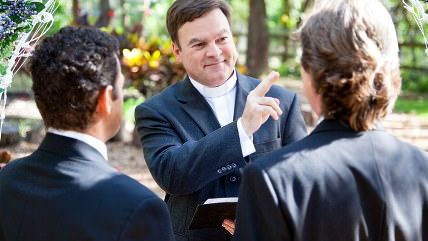The Supreme Court Probably Won't Restore Real Freedom of Association, But It's Nice to Dream
Public accommodation disputes treated as a First Amendment issue instead.

Today the National Constitution Center, a nonpartisan nonprofit institution devoted to exploring the intricacies of the U.S. Constitution, has posted a lively podcast of two legal scholars of interest to those following the case of Elane Photography v. Willock. That's the New Mexico photographer who refused to shoot a gay wedding and got into legal trouble for violating the state's public accommodation and anti-discrimination laws. The photographer has lost every step of the way and is asking for a Supreme Court review.
I bring up the podcast because holding up the libertarian side of the debate is Richard Epstein of New York University, arguing against Michael Dorf of Cornell. Both men note that the case is based around whether Elane Photography can claim a First Amendment exemption from public accommodation laws, not the laws themselves. But Epstein would like to see a restoration of real, honest-to-god recognition of freedom of association, which he argues has been "dashed to bits" by Supreme Court decisions from the 1930s on:
"Every person has the ordinary liberty to pick the persons with whom he wishes to deal and the terms and conditions on which they wish to trade. … There is no theory that I am aware which indicates the heavy hand of the government with its elaborative administrative structure can do better than competitive markets to sort out all these issues."
Of course, the debate cannot help but to examine the Civil Rights Act of 1964 and how Southern racism has impacted business law. Epstein notes the significant amount of government force and monopolistic protection that was part and parcel of keeping racist business practices alive in the south. He defended anti-discrimination policies in situations where consumers honestly don't have many choices, but he does not see any behavior of that sort when analyzing a business's refusal to serve gay couples:
"This is a case in which there's an absolute juggernaut in favor of same sex marriage. The transformations in my lifetime from the time when it was a criminal offense to be gay to the time where it is in fact a preferred freedom is nothing short of astonishing."
Dorf invokes a concept of "economic citizenship" to explain the idea that the government can set the policies by which businesses and corporations offer their services. Epstein, though, notes that there are no reverse expectations. Customers still have their freedom of association. We would consider it unconscionable if a gay couple were ordered to purchase a cake or hire a photographer from a business who opposed their relationship. In his conclusion Epstein notes:
"I think the problem that we have is that some of us have such strong ideas about what a just society looks like that we don't think long and hard about whether or not we're entitled to impose our will. And the basic argument is this: The stronger the consensus for open public accommodations, the weaker the need for the law."
I previously wrote how these gay marriage conflicts were more about what we classify as public accommodations than who does or doesn't get exemptions under the First Amendment, so I'm pleased to see a constitutional scholar make a similar argument. Epstein, though, given his background, makes a much more articulate case than l'il ol' me.
Listen to the podcast below:


Show Comments (125)